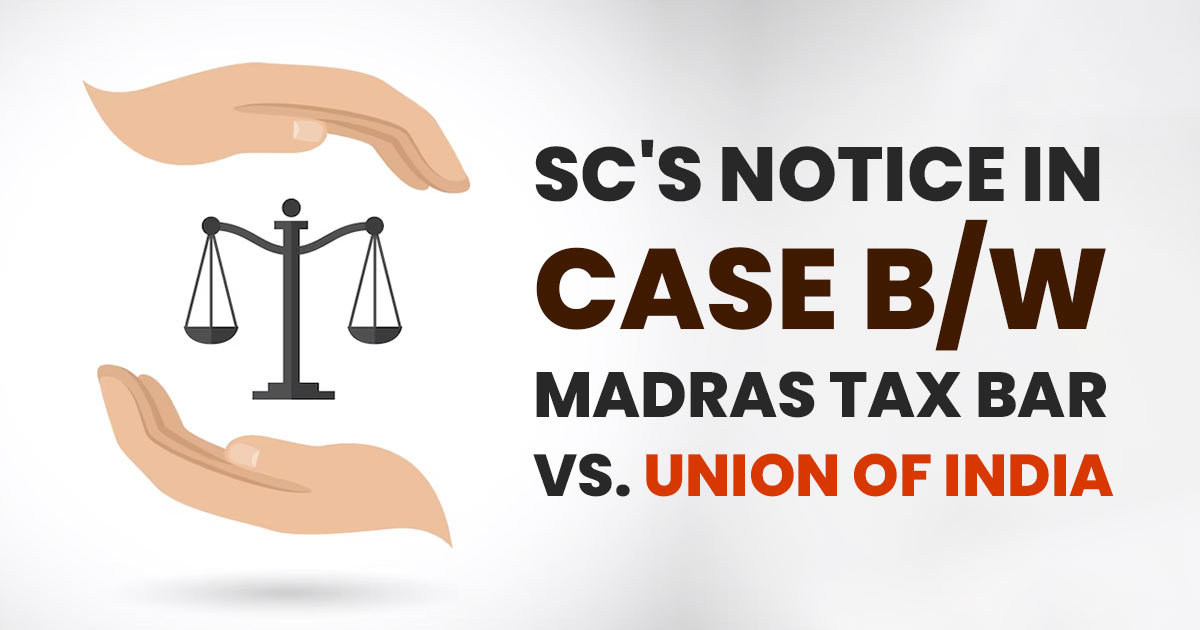
Towards the petition that the Madras Tax Bar filed contesting the constitutional validity of sections 149 and 150 of the Finance Act of 2023, the Supreme Court has furnished the notice that asks for the substitute of sections 109 and 110 of the Central Goods and Services Tax Act of 2017. The specific areas under discussion pertain to the selection process and duration of service for individuals serving on the GST Appellate Tribunal within the CGST Act.
A Senior Advocate represented the petitioner, an organization of tax lawyers, in front of a panel comprised of Chief Justice DY Chandrachud, Justice JB Pardiwala, and Justice Manoj Misra. The proposed amendment stipulates that lawyers cannot qualify as judicial members of the GST Appellate Tribunal. The petitioner argued that this amendment contradicted four previous rulings by Constitution Benches of the Supreme Court.
He added that the advocates are not get qualified to apply for the judicial positions. From serving as a judicial member the advocates are not suppressed in any tribunal in the country.
For the case, the CJI-led bench issued the notice and authorized the Attorney General of India to serve a copy of the petition on him.
The PIL contested Sections 149 and 150 of the Finance Act, 2023 that asks to replace Sections 109 and 110 of the CGST Act, particularly with regard to Sections 109(9), 110(1)(b), 110(1)(c), 110(1)(d), 110(4)(b)(ii), 110(4)(b)(iv), 110(6), 110(8), 110(9) and 110(10) of the CGST Act which is pertained to appointments and conditions of service of members to the GST Appellate Tribunal under the CGST Act.
Read Also: 2 Judicial & 2 Technical Members GST Appellate Tribunal to Be Setup in Every State
The provisions as per PIL breaks 14, 19, and 21 read together with Article 50 as they violate the principles of judicial independence, rule of law, and separation of powers.
As per the petition the direct breach comprises of:
- Advocates are suppressed from being designated as judicial members [CGST Act Section 110(1)(b)].
- Officers with vague and non-adjudicatory experience below the rank of Secretaries and Additional Secretaries are now qualified for appointment as technical members [CGST Act Sections 110(1)(c) and 110(1)(d)].
- Section 110(6) of the CGST Act needs the Search-cum-Selection Committee to suggest a panel of two names for each appointment.
- For 4 years the members of the Appellate Tribunal serve with the reappointment possibility for two additional years with the 67 years retirement age for the President and 65 years for the other members [Sections 110(9) and 110(10) of the CGST Act].
The Public Interest Litigation (PIL) pointed out that in 2017, the Parliament passed the CGST Act, which included provisions for the establishment of the Goods and Services Tax Appellate Tribunal under Sections 109 and 110 of the Act. However, despite these provisions, the Appellate Tribunal never became functional. On January 1, 2023, the Union Government introduced the Finance Bill, 2023 in the Lok Sabha.
It’s important to highlight that, at that time, the Finance Bill, 2023 did not include any provisions related to the GST Appellate Tribunal. According to the petitions, on March 22, 2023, last-minute amendments were made to the Finance Bill, 2023, introducing Sections 137A to 137G, which amended the provisions of the CGST Act.
Section 137B proposed changes to Section 109 of the CGST Act, while Section 137C proposed modifications to Section 110 of the CGST Act.
The petition stated that different amendments were proposed to the Appellate Tribunal‘s constitution, qualifications for members, the appointment process, and the terms of service of the members to be designated via such amendments.
It also mentioned that the replaced Sections 109 and 110 comprise the provisions that are directly and clearly in breach of different decisions of this Hon’ble court where the identical provisions were ruled to be unconstitutional as they affect the independence of the judiciary the rule of law and the separation of powers that all are part of the basic layout of Constitution and are sourced in Articles 14, 19, and 21, amongst others.









